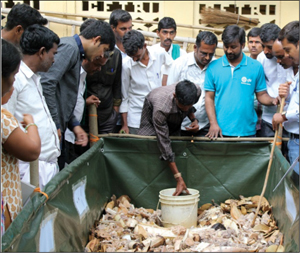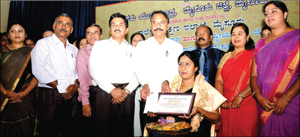Crossing a revenue of Rs three crore per annum, dairy farmers in Idkidu village of Bantwal taluk have set a benchmark in the history of white revolution in the district.
There are three milk producers’ societies — ‘Amruthadhara’, ‘Amruthasindhu’ and ‘Amruthavarshini’ — situated in Idkidu, Soorya and Mittoor respectively.
Soorya Milk Producers’ Cooperative Society president Dr Krishna Bhat Konkodi said that on an average, the total collection of milk from all the three societies per day is 2,500 litre. Out of the total production, 2,200 litre of milk is contributed to the Dakshina Kannada Milk Union and the rest 250-300 litre is meant for local sale.
With the dairy farmers in the village earning Rs 34 on each litre of milk (including government subsidy of Rs four), the total revenue of diary farmers in the village is Rs 3.10 crore, he said. Today, Amruthadhara collects 985 litre, Amruthasindhu collects 686 litre and Amruthavarshini collects 530 litre of milk on a daily basis. At present, Amruthadhara has 96 active members, while Amruthasindhu and Amruthavarshini have 96 and 67 active members respectively.
The Idkidu Milk Producers’ Cooperative Society began operations in 1995-96 and was the first milk producers’ cooperative society in the region. Branches of the society were opened in Soorya and Mittoor eventually as the milk production increased.
During the inception of Idkidu Milk Producers’ Cooperative Society, there were 28 active members and the annual production of milk was 4,449 litre with an annual net profit of Rs 5,808.
During the fiscal year 2015- 2016 which ended in March, the annual production of milk reached 2,18,402 litre, which comes up to 650 litre per day on an average and the annual profit was Rs 1,82,000.
Krishna Bhat, who was an Associate Professor at Karnataka Veterinary, Animal and Fisheries Sciences University in Bidar, quit his job and took over the society in the capacity of president. As a veterinary doctor, he carries out private practice in the region.
Youth take initiative
Krishna Bhat opined that carrying out diary farming along with agriculture has proved to be profitable. Seven years prior, a diary farmer earned RS 12 on each litre of milk, while today, the price has increased three-fold. Hence, many youth have been adopting diary farming in rural areas like Idkidu these days and migration to towns in search of jobs has reduced to a great extent.
The farmers in the region have been successfully carrying out dairy farming which goes hand in hand with mixed farming. Areca, pepper and plantain are generally grown in the region. Dairy farming has a lion’s share in integrated farming. The farmers have installed gobar gas units in their farms so that gas can be used for cooking and the slurry as manure. The organic manure not only increases the fertility of soil, but also retains the moisture content of the soil for a long time, which helps in times of water scarcity. This is the main advantage of organic manure over chemical fertilisers, Bhat said. The KMF provides Rs 4,500 to 5,500 as subsidy for setting up the gobar gas units to diary farmers, he said. Now there are more than 160 gobar gas units in Idkidu village.
Cattle feed
The Soorya cooperative society has set up an areca plate unit on the society premises. At the unit, plates are prepared out of areca sheaths and cattle feed is prepared from the leftover material of the sheaths. The sheaths that go wasted are chopped into pieces using a shredding machine. The unit started four months ago and is being maintained by the local self-help group. The areca sheaths are purchased from areca growers at Rs one per piece. Two plates can be prepared from a single dry sheath using the moulding machine. The labour cost incurred is Rs one per sheath. There is an expenditure of Rs 2,450 on LPG which is used to run the machines. The rent of the building is Rs 1,000 per month. The packaging costs come up to Rs 610. The machines have been purchased with the Rs 50,000 subsidy given by Nabard.
The areca plates are exported through a tie-up with Eco Vision in Vittal. As many as 9,123 plates and 500 kg of fodder have been prepared since February 1. A plate is sold at Rs 2.5 and the fodder is sold to diary farmers at Rs six per kg. A net profit of Rs 6,461 is earned by the sale of areca plates and 200 kg of fodder. There have been 42 days of man work in the past four months. The fodder prepared from areca is a substitute to dry grass which is generally brought from the Malnad region. Also, it is better compared to dry grass as does not contain any oxalate content or insecticide residue and hence, is safe for cattle, Bhat added.
source: http://www.deccanherald.com / Deccan Herald / Home> District / DHNS / Mangaluru – June 03rd, 2016







